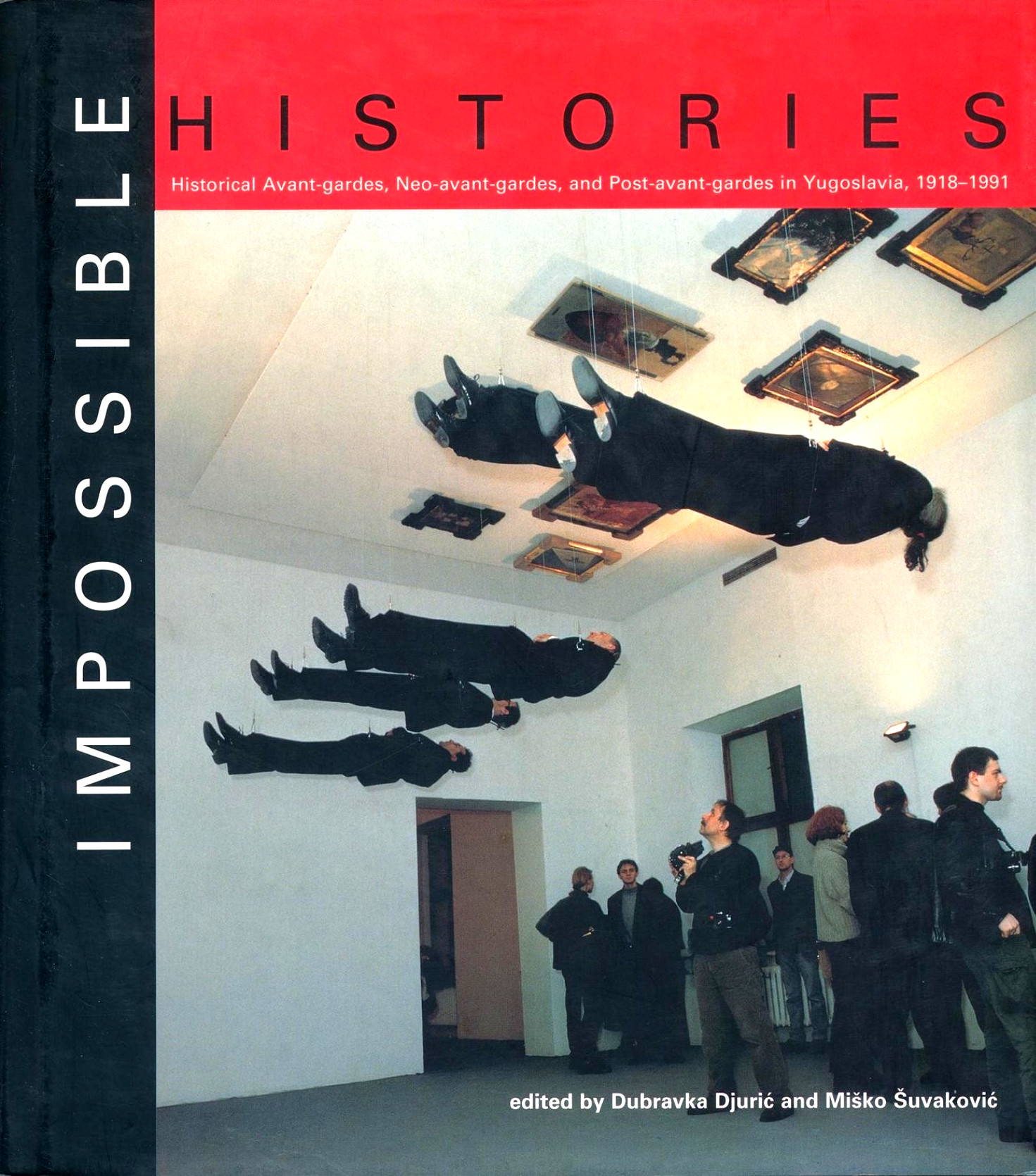Dubravka Djurić, Miško Šuvaković (eds.): Impossible Histories: Historical Avant-gardes, Neo-avant-gardes, and Post-avant-gardes in Yugoslavia, 1918-1991 (2003)
Filed under book | Tags: · architecture, art history, avant-garde, conceptual art, literature, manifesto, music history, neo-avant-garde, post-avant-garde, postmodern, retro-avant-garde, video art, yugoslavia

“Impossible Histories is the first critical survey of the extraordinary experiments in the arts that took place in the former Yugoslavia from the country’s founding in 1918 to its breakup in 1991. The combination of Austro-Hungarian, French, German, Italian, and Turkish influences gave Yugoslavia’s avant-gardes a distinct character unlike those of other Eastern and Central European avant-gardes. The book explores movements such as Belgrade surrealism, signalism, Yugo-Dada, and zenitism; the groups Alfa, Exat 51, Gorgona, OHO, and Scipion Nasice Sisters Theater; or the magazines Danas, Rdeči pilot, Tank, Vecnost, and Zvrk.
The pieces in this collection offer comparative and interpretive accounts of the avant-gardes in the former Yugoslavian countries of Croatia, Serbia, and Slovenia. The book is divided into four sections: Art and Politics; Literature; Visual Art and Architecture; and Art in Motion (covering theater, dance, music, film, and video). All of the contributors live in the region and many of them participated in the movements discussed. The book also reprints a selection of the most important manifestos generated by all phases of Yugoslav avant-garde activity.”
Publisher MIT Press, 2003
ISBN 0262042169, 9780262042161
xviii+605 pages
via agitprop
Reviews: Suzana Milevska (Springerin, 2004), Matthew S. Witkovsky (caa.reviews, 2004), Yevgeniy Fiks (Art Journal, 2004), Tyrus Miller (Modernism/modernity, 2005), Igor Marjanović (Design Issues, 2007).
PDF (22 MB)
Comment (0)François Cusset: French Theory: How Foucault, Derrida, Deleuze, & Co. Transformed the Intellectual Life of the United States (2003–) [FR, EN]
Filed under book | Tags: · deconstruction, feminism, france, history, history of philosophy, literary theory, marxism, philosophy, politics, postmodern, poststructuralism, structuralism, theory, united states

“During the last three decades of the twentieth century, a disparate group of radical French thinkers achieved an improbable level of influence and fame in the United States. Compared by at least one journalist to the British rock ‘n’ roll invasion, the arrival of works by Michel Foucault, Jacques Derrida, Jean-François Lyotard, Jean Baudrillard, Gilles Deleuze, and Félix Guattari on American shores in the late 1970s and 1980s caused a sensation.
Outside the academy, “French theory” had a profound impact on the era’s emerging identity politics while also becoming, in the 1980s, the target of right-wing propagandists. At the same time in academic departments across the country, their poststructuralist form of radical suspicion transformed disciplines from literature to anthropology to architecture. By the 1990s, French theory was woven deeply into America’s cultural and intellectual fabric.
French Theory is the first comprehensive account of the American fortunes of these unlikely philosophical celebrities. François Cusset looks at why America proved to be such fertile ground for French theory, how such demanding writings could become so widely influential, and the peculiarly American readings of these works. Reveling in the gossipy history, Cusset also provides a lively exploration of the many provocative critical practices inspired by French theory. Ultimately, he dares to shine a bright light on the exultation of these thinkers to assess the relevance of critical theory to social and political activism today—showing, finally, how French theory has become inextricably bound with American life.”
Publisher La Découverte, Paris, 2003
ISBN 2707146730
373 pages
English edition
Translated by Jeff Fort, With Josephine Berganza and Marlon Jones
Publisher University of Minnesota Press, 2008
ISBN 0816647321, 9780816647323
388 pages
Reviews: Jennifer Ferng (Leonardo), Juliet J. Fall (Foucault Studies), Ethan Kleinberg (NPDR), Bridie Lonie (Junctures, FR).
French Theory: Foucault, Derrida, Deleuze & Cie et les mutations de la vie intellectuelle aux États-Unis. (French)
French Theory: How Foucault, Derrida, Deleuze, & Co. Transformed the Intellectual Life of the United States. (English)
Fredric Jameson: The Geopolitical Aesthetic: Cinema and Space in the World System (1992)
Filed under book | Tags: · aesthetics, capitalism, cinema, film, film theory, narrative, philosophy, politics, postmodern

Taking contemporary films from the United States, Russia, Taiwan, France, and the Philippines, The Geopolitical Aesthetic offers a reading of some of the most interesting films of the last decade and a general account of filmic representation in the postmodern world. Fredric Jameson poses some essential questions: How does representation function in contemporary film? How does contemporary cinema represent an ever more complex and international social reality? Jameson’s sophisticated and theoretically informed readings stress the ways in which disparate films—for example, Godard’s Passion, Pakula’s All the President’s Men, Yang’s The Terrorizer, Tahimik’s The Perfumed Nightmare, Tarkovsky’s Andrei Roublev—confront similar problems of representation. The solutions vary widely but the drive remains the same—the desire to find adequate allegories for our social existence.
The Geopolitical Aesthetic, a refinement and development of the arguments put forward in Jameson’s seminal work The Political Unconscious, is crucial reading for everyone interested in both film analysis and cultural studies.
Publisher Indiana University Press, 1992
Perspectives Series
ISBN 0253330939, 9780253330932
220 pages

